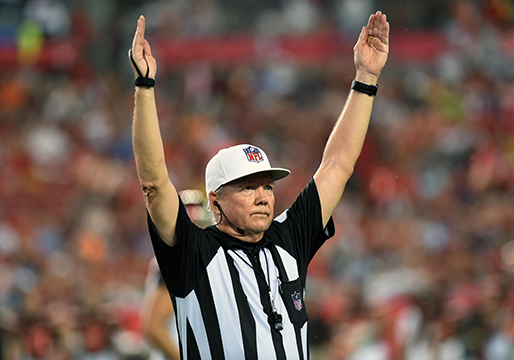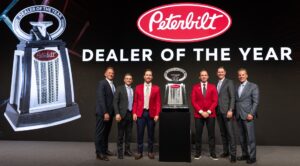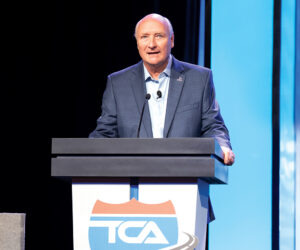When we descended on the Hiland Dairy plant in Little Rock, Arkansas, recently to interview him, a gregarious Walt Coleman greeted us at the door.
No receptionist necessary, thank you.
“I saw you drive up in the parking lot,” he told us. “Come on in.”
Coleman is a man who for the past 30 years has led a double life — quiet, unassuming, successful dairy executive during the week; highly visible, successful National Football League referee on the weekend.
Coleman has been so successful in his weekday role that for a while he headed up the family dairy business, which had started in 1862 when his ancestors moved to Arkansas, set up a business with dairy cows and delivered milk out of a wagon on Main Street in Little Rock.
As an NFL official he’s only one of seven men who’ve spent 30 or more years officiating in America’s favorite pastime.
He was hired into the NFL in 1989 as a line judge and in 1995 was promoted to referee.
The referee, you know, is the man with the white hat who talks to millions each week at stadiums and on television, pronouncing penalties, explaining nuances of the game and sometimes has to admit his crew made a bad call (what NFL fan isn’t familiar with the phrase “after reviewing the play …”?).
His final “after further review” came on a positive note when he decided to call it a career after the 2018 season. So when the National Football League kicks off next month, there will be no Walt Coleman on the field… oops that’s not entirely correct.
The Walt Coleman who spent 30 years as an official won’t be there, but his son Walt IV will be working as a line judge.
What’s more, in a tribute to his dad Walt IV, who will be in his fifth year as an NFL official, turned in his No. 87 jersey for the No. 65 worn by his dad.
“I loved the idea,” said his dad.
More about football later, but first let’s talk about Coleman’s day job.
He was born and raised in Little Rock, growing up right near the dairy plant. It was a given that after he graduated from the University of Arkansas in 1974 he would return home to work at the dairy.
“It was something that I always wanted to do,” said Coleman, sitting comfortably in his unassuming office surrounded by reminders of his officiating days. “I had three brothers and we all had different interests as far as the dairy was concerned. One of my brothers was a freshman in college when I was a senior. By the time I graduated we had decided one of us needed to be a lawyer, and since I was graduating, I said, ‘OK, you’re the lawyer.’ So, my brother Charlie became a lawyer. You have to have a lawyer because without a lawyer, you can’t do anything in business.”
Walt Coleman earned his degree in general business.
Today, Charlie Coleman is a partner at a large Little Rock law firm.
Another of his brothers, Bob, passed away in 2016, and his other brother, Cherb, runs the dairy plant today.
The family-owned Coleman Dairy was sold in 1996 to a local farmers cooperative. Then in 2006, farmer-owned Prairie Farms of Carlinville, Illinois, which owns Hiland Dairy, bought the business, making Coleman a division of Hiland.
Hiland allowed Coleman to produce products under the Coleman name until the Coleman company’s 150th anniversary in 2013, after which products were produced under the Hiland brand.
Today, Walt Coleman serves as the company’s controller, having relinquished the general manager’s position because of his work with the NFL.
One reason Hiland allowed the dairy to keep the Coleman brand until 2013 was the company’s heritage in the Little Rock market.
“I think the Hiland people recognized the fact that [using the Coleman name] helped the transition because we were still involved and there was no change in the operation.”
Hiland or Coleman brand aside, the fact is things have changed in the dairy production business.
“Probably 25% of our products are our brand and 75% is somebody’s private label, Coleman said. “We ship milk all over the Southeastern part of the country into grocery warehouses with private label brands because that’s where the volume is. Kroger has its own milk plant. Walmart has put in their own milk plant up in Indiana. Down in Florida, Publix has its own plant. So does HEB in Texas. It’s made it very hard for the individual family-owned people like us to survive.”
For obvious competitive reasons, Coleman couldn’t name for whom Hiland produces private-label products.
One of the reasons Coleman Dairy had to sell is that it needed to be tied in with somebody that had more regional pull.
“And so now, with Hiland being part of Prairie Farms, they can negotiate these contracts with national companies, and that helps us, whether it’s restaurants that are national or whether it’s grocery chains there are national or whether it’s nursing homes that are national. And locally, the only thing you get are schools, because they’re all still locally operated. It’s a challenge. I’m the controller now. I was the general manager and it was just too much for me to do with my football stuff.”
Hiland runs 900,000 gallons of products a week, including somewhere close to 800,000 gallons of milk. All products produced at the Little Rock plant are liquid.
Not only is Hiland in the dairy and liquid products business, it’s in the transportation business in that it transports its own products. And with that come all the issues all motor carriers face, primarily finding drivers.
“Obviously, to us the transportation sector is huge and that is compounded by the fact that our products have to be refrigerated,” Coleman said. “We have deliveries from our small bob trucks that deliver to schools and nursing homes all the way to over-the-road rigs. We operate our own tractor-trailers but also contract out for longer hauls. And just like with everybody else, one of our biggest challenges is finding drivers. Even with our route drivers, they have to have CDLs.”
Moreover, Coleman said, he’s not just looking for CDL holders, but drivers who are proficient in sales.
“We’ve gone every direction as far as trying to get people that we thought would just be good employees and teach them how to get their CDL and teach them how to drive. And we’ve tried to hire guys with CDLs. But we’re looking for somebody that is presentable, that’s got a good personality, that’s sharp, because each of our drivers is having to operate a handheld computer. So, we’re looking for a pretty high-quality person as a driver.”
The personable Coleman could talk all day about the dairy business, but it was time to move on to football and his stellar career with the NFL, which came about from encouragement by his father.
We’ll let him talk about it in his own words:
Why has the National Football League become the sport now?
I think because it’s made for television. Baseball on television is kind of slow, although a baseball game live is great. With hockey, it’s hard to see the puck, and you can’t see the stuff that’s going on off the camera. Then you add all the things they’ve done now with replay and all the cameras and so forth. And then you add fantasy football, which has resulted in people watching games that they don’t care anything about because they’ve got a fantasy player in that game. Nobody would watch Cleveland games back when they were terrible. They weren’t winning any games, but they would watch if they had a Cleveland receiver, if they had the Cleveland quarterback. I’m so close to it sometimes I don’t realize how big it really is until I kind of sit back and listen and analyze what’s going on.
You became a referee well into your career. How did all that come about?
Well, when I got into the NFL, I was very fortunate to be on Jerry Seeman’s crew. He was the referee, and I was with Jerry for two years, and he was an educator, he was a teacher. And he really helped me as far as learning the rules and learning what it took. I’d been around officiating a lot, so it wasn’t like I was the dummy from an officiating standpoint. Jerry really helped me, and when he became the supervisor of officials in New York, he knew the type of person I was. And at some point after that, he asked me if I had any interest in becoming a referee. And I said, “Well, sure. At some point, I think, I would like to be a referee.” And so, he said OK, and in 1995, NFL Europe came back. And he had me have a crew in NFL Europe in the spring. Well, that fall I was going to be a line judge again on Bernie Kukar’s crew, which I had been on since I went off of Jerry’s group, and that was the year they brought in Jacksonville and Carolina. I might not have been chosen except the man already chosen had a heart problem, and Jerry asked me if I wanted the job.
What’s been the highlight of your career?
Just the opportunity to be out there, being involved with players who are the best at what they do in the whole world. To be able to stand there on the sidelines and have the national anthem played, and then go out there and get ready for the kickoff. I know there’s nothing that can replace that feeling. There’s not anything that I can do from now on that will replace the feeling that you get from going out there and being involved in something like the National Football League. You know, it’s just the opportunity that I had for 30 years with 450 NFL football games. I had the opportunity to be out there and be able to see people like Joe Montana and Jerry Rice and Emmett Smith and Barry Sanders and Troy Aikman and Brett Favre and Tom Brady, the Mannings and Aaron Rodgers.
You had good relationships with them, I assume.
Yeah, pretty much. There are always a few guys that are problems and so forth.
I saw a picture of Tom Brady talking to you after a game.
Yes, he came out my last regular season game. I was in New England and he wasn’t playing that day. After the last play, Tom came from the bench. Normally, we immediately run off the field, but all the guys on my crew all came and got around me and were all congratulating me, shaking my hand. So, we were still out there longer than normal. And Tom came over there and congratulated me on my career and we shook hands, and that was really nice. He didn’t have to do that; he could have gone on and shook hands with the other team’s quarterback like they normally do, but he made a point to do that. And I appreciated that.
How complicated are the rules, really? There’ll be a play, and as a fan you say, “What?”
Very complicated. [Coleman holds up a thick book] This is the rule book, and the casebook with all different kinds of [rules]. In the casebook [it says], “if this happens, what do you do?” You know, it’s like, the law. It’s like with the lawyers, they have case law. This is what the law said, well, how’s it interpreted? You have to know the rules and then you have to know how to interpret what the rules say. So, this is the rule book and the casebook and they’re very complicated. One of the things people say is, “well, you’re not full time.” I can tell you I spend too much time working on this and you can’t stop. During the off-season after the Super Bowl, everybody gets three or four off weeks and then they’ll start putting out rules tests for the officials. You have to keep working on the rules. Otherwise, you’re going to forget them, because you have to know [them]. I’ve had plays that have only happened one time in my career and I had to get them right when they happened.
Like the play with the tuck rule [which got much attention in an NFL playoff game] which nobody had heard of until that 2001 season divisional playoff game. [It appeared New England’s quarterback had fumbled while bringing his arm forward to pass, a fumble that was recovered by Oakland. But after video review, Coleman, the referee, correctly ruled that Brady had been trying to tuck the ball back into his chest. The rule has since been eliminated.]
That’s right. The rule had been there and I [had been] educated [on it]. Unfortunately, I had to be the one to educate everybody in the stadium and on television, and I still haven’t educated the Oakland people. I mean they’re still not educated.
In the season, what is the week like for you?
We have to be at the game site around noon on Saturday. So, I’m on the first flight out on Saturday morning. I’m usually going east so I leave on a Delta flight about 6 a.m. We have our meeting, which I was responsible for, and then Sunday all our crew, we all have a devotional Sunday morning, then go to the game, work the game, and then hopefully if it’s a noon game or 1 p.m. game, they bring us back to the airport and we fly out and I get home like at midnight on Sunday night.
Between dairy and the NFL, I was working seven days a week from July until February. On Tuesday after a game, the league would send me an external hard drive that had all the games on it, so you could evaluate what went on in your game. In New York, there were supervisors who were grading the games on Monday and Tuesday. Then, Tuesday afternoon they would send out our initial evaluations as far as whether we got calls right or wrong, ‘We should’ve called this …,’ all those things being evaluated. And then we analyze that and we respond.
Then, on Wednesday we would get our final report on what they think about how the game was officiated. After that, I would start preparing for my meeting on Saturday. I would have all the other games from that previous week and we would start looking at the teams that were getting ready to work. And I would have a set of plays to look at in preparation for them.
It’s all about training. It’s all about trying to get better. And it’s all about consistency, because everybody wants everything to be the same. Every coach wants the calls to be the same. No matter what crew it is, they want the calls to be the same. They want holding this week to still be holding next week, [to be] all the same.
And so, when you have 17 crews of seven guys, that’s a challenge. And the league puts out training videos that show ‘this guy’s holding, we want this call, [and] this is not holding. This is pass interference, this is not pass interference’. They put out videos that we also look at in our meetings. There’s a lot that goes on, a lot of time involved that most people don’t realize.
What are the most difficult calls to make?
I think that it’s the judgment calls. I think pass interference is really difficult because everybody’s moving, the officials are moving, trying to stay back and stay deep. It’s judgment. Is there enough restriction there to be a foul? So that one’s really difficult. Holding is one that has to be at the point of attack, and so I think holding is difficult because it’s more of a judgment. Hits on the quarterback are also judgment. It’s the hits on the quarterback. Is it roughing the passer? Is it a foul or is it not? And in the pass fumble is it a pass or is it a fumble? Was it an empty hand? Those are the two plays that are difficult for me as the referee.
How did instant replay change officiating when they started reviewing calls?
I don’t know how much it changed officiating. It gave us the ability to get stuff right that we couldn’t otherwise get because it happened so fast. With TV, you can go frame by frame. You don’t see frame by frame. So, we’re able to fix stuff that we could never have fixed. From an officiating standpoint, I don’t know that it’s changed anything, it’s just made officiating on the field more difficult, especially on catches, because you can see stuff on the camera that you couldn’t see. Did he have control of it? That’s where we’ve been all over the place as far as what’s a catch and what’s not a catch. But I like replay. If it can fix a mistake, it’s not a mistake. And nobody remembers if you get it right. They only remember when you get it wrong.
What’s been the biggest change in the players during your career?
Well, obviously they’re bigger and faster. They’re huge. I was sorry to see that Glen Ray Hines [Arkansas Razorback tackle in the 1960s] died and, you know, he was a huge player, 6 feet 5 inches, 235 pounds. That’s a quarterback now. The focus on safety has been a huge change since I’ve been in the league. And the technology of everything has just been unbelievable, the stuff that they’re using now. And being able to communicate, having an earpiece and being able to communicate with New York. In 1989, you had those big bag phones. And now they say this little thing here has more power than the computers that took us to the moon. Technology has changed so much. And obviously the video, high definition. You can see stuff now that back when we were putting tape on VHS … or before that, when we had the reel-to-reel stuff, you couldn’t hardly see anything. But now, you can’t hide now. I mean, everything is so clear with 115 cameras at the Super Bowl.
Is the family happy that you’ve retired?
Well, I don’t know. I mean, my wife is a little concerned, you know, because I’m going to be around and, you know, it’ll be interesting. Everybody’s asking me how I feel about it. Well, right now nothing’s any different. I mean, I worked the whole season and now it’s kind of a quiet period, so it’s not really going to be anything new.
Any regrets?
I don’t know. I don’t know that you’d necessarily call it a regret. I would have liked to have had the opportunity to referee a Super Bowl and I never got the chance to do that. I did two championship games, but I never got to do the Super Bowl. I was an alternate three times. But a lot of players would like to have played the Super Bowl, too, and they never got the chance. So I don’t really know. I wouldn’t necessarily call that a regret. It’s just something that it would have been nice to have had an opportunity to do that. But like I said, I mean, I got to work 30 years in the National Football League and very few guys can say they’ve been fortunate enough to do that.
Lyndon Finney’s publishing career spans over 55 years beginning with a reporter position with the Southwest Times Record in Fort Smith, Arkansas, in 1965. Since then he’s been a newspaper editor at the Southwest Times Record, served five years as assistant managing editor of the Arkansas Democrat-Gazette in Little Rock and from November 2004 through December 2019 served as editor of The Trucker. Between newspaper jobs he spent 14 years as director of communications at Baptist Health, Arkansas’ largest healthcare system. In addition to his publishing career he served for 46 years as organist at Little Rock’s largest Baptist church.








